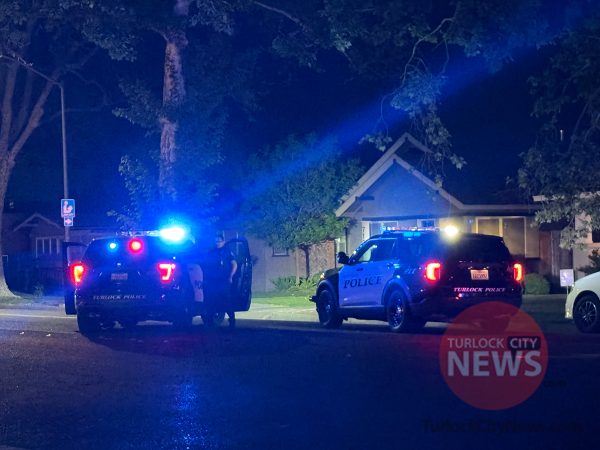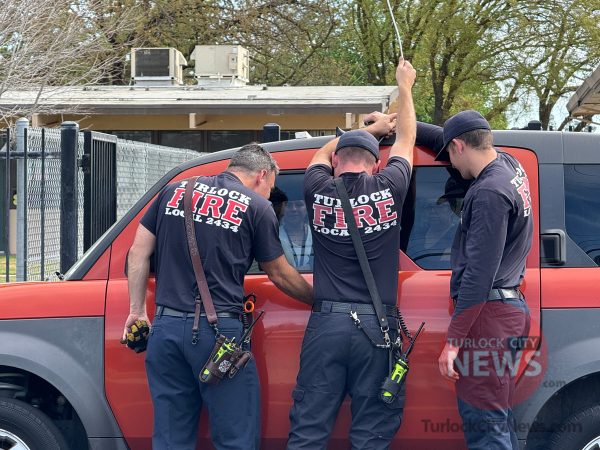The City of Turlock made its first legislative move toward a permanent ban on siting food trucks in Downtown Turlock Thursday night – but only barely.
A split, 4-3 majority of the Turlock Planning Commission voted in favor of an ordinance amendment that would forever ban new food trucks from doing business in Downtown Turlock. Two food trucks currently permitted in Downtown Turlock – Vida Vital, a smoothie and wrap truck, and Saucy Girls, specializing in sliders and hot dogs – would be forced to move by Jan. 1, 2015.
The ban still awaits a final decision by the Turlock City Council. The council will consider the matter at a currently undecided future date.
The Planning Commission’s decision, which is nonbinding, came as part of a much larger motion taken Thursday night, which looks to overhaul the entire Turlock zoning ordinance. That ordinance amendment addresses issues ranging from cargo containers to accessory structures and electrified fences.
Most elements of the proposal are relatively uncontroversial, and were broadly endorsed by the Planning Commission. But the decision to ban food trucks from Turlock’s downtown was divisive.
Commission Chair Soraya Fregosi and Commissioners Jeanine Bean and Victor Pedroza were supportive of food trucks remaining in Downtown Turlock. Commissioners Elvis Dias and Nick Hackler joined with Commission Alternates Alice Pollard and Ashour Badal to oppose Downtown Turlock food trucks, creating a 4-3 majority in favor of the ban.
Commissioners Mike Brem and Jeff Hillberg did not attend Thursday’s meeting, leading to Pollard and Badal’s participation in the vote.
Debate on the measure, which has been under discussion in some form since late 2013, was limited. No members of the audience spoke directly on the issue, and only a handful of citizens have spoken at past hearings — predominantly, those who either own a food truck or are involved with the Downtown Property Owners Association, which opposes the food trucks.
The DTPOA argues that the food trucks are inappropriate for Downtown Turlock on several counts. Not only do the trucks not fit with the aesthetic and character of historic Downtown Turlock, detractors say, they also harm existing downtown restaurants.
Mobile food vendors face fewer start-up costs, allowing them to sell cheaper food while taking advantage of the benefits of operating in Downtown Turlock. And the DTPOA doesn’t earn money from food trucks; brick-and-mortar businesses pay 42 cents per square foot to fund downtown programs, but as food trucks have no building they pay no such fee.
Supporters say that food trucks create jobs, inspire entrepreneurs, and contribute to the vibrant, diverse range of businesses that draws people to Downtown Turlock. They also note that the lots where food trucks operate would otherwise sit empty, adding nothing to Downtown Turlock’s atmosphere.
Though the DTPOA’s past arguments have focused, at times, on issues of fair competition, Turlock Planning Manager Debbie Whitmore noted that those concerns could not play into the Planning Commission's vote.
“We are prevented, as a city, from making our decision based on matters of competition,” Whitmore said.
Instead, Whitmore advised that Planning Commissioners consider whether they believed food trucks were compatible with the vision of downtown, its atmosphere, culture, aesthetics, and values.
That helped with making a decision, Dias said, as he voted in favor of the ban.
But Fregosi said she took issue with the actual size of downtown, as defined in the ban. The provision’s language would, essentially, ban food trucks from in a triangle of land roughly bordered by Canal Drive, Minaret Avenue, and Thor Street, as well as along East Main Street and parts of South Broadway.
“That's a little bit too restrictive to me,” Fregosi said, noting she would have supported a measure that banned the trucks only from Main Street.
After the decision was made, commissioners noted their surprise at the lack of public involvement in the issue. Though the issue has been broadly discussed on social media websites, citizens have not turned out to participate in the many public hearings.
“We asked for a lot of participation, and we got none,” Pollard said. “That also helps with our decision.”
“It does not appear there are a lot of strong feelings about this item,” Fregosi agreed.







